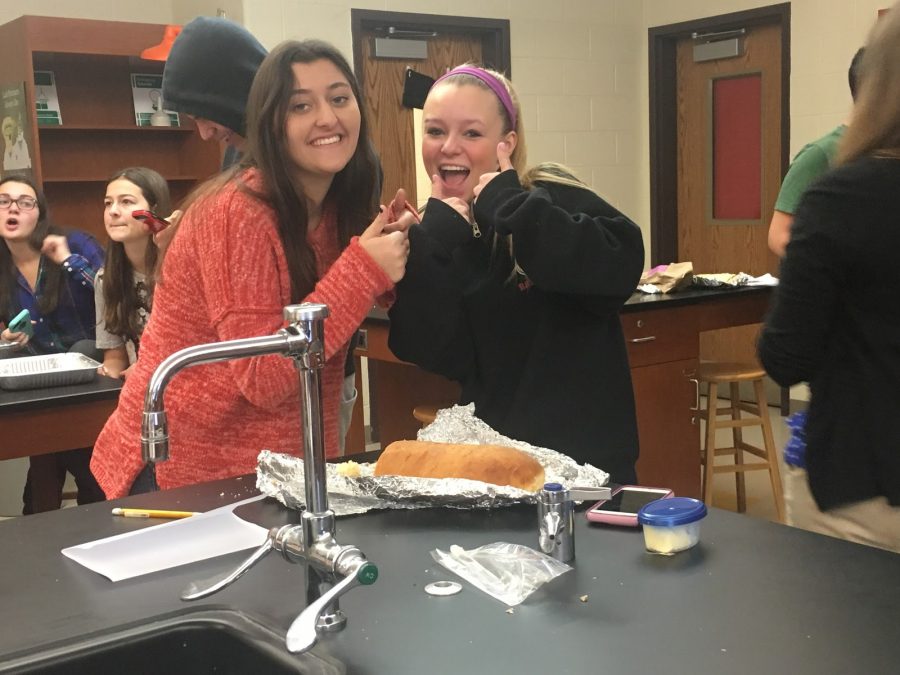Freshmen biology class competes in bake-off lab
Photo Credit: Jenny DeStefano
Freshman Lillie Daschil and Anna Rasmussen pose in front of their bread during judging.
January 17, 2017
Freshman science teachers’ labs have risen to a new level by recently assigning a biology bake-off.
Students were designated a special type of lab in the study of their new chapter. Teachers organized a bake-off for pupils to present their yeast-included baked goods.
“It was one of the more fun labs because it was helpful to get everyone involved and learning,” freshman Natalie Brangaccio said.
In an effort to raise enthusiasm for learning about cell respiration and fermentation, students were challenged to each bake a type of bread affected by those processes. The only requirement for the project is that it had to include yeast. Though many were thrilled by the baking process, others found it challenging to produce the lab report that would lead up to the final judging.
Even though the teachers orchestrated the lab, the students were able to rate and review each other’s creations to award one lucky pupil with the “Golden Loaf Award” – an extra credit point on the upcoming exam. A stack of review slips were placed next to each product that rated appearance, smell, texture, and taste on a scale from one to five.
“Each teacher rates their students’ breads differently,” biology teacher Jennifer Ammirata said. “After the peer grading process, I go through and tally every single bread for every single category, and the person who scores the highest overall average earns a bonus on their cellular respiration quiz.”
Nevertheless, this lab was not all fun and games. To add an extra challenge and a cognitive component, participants were required to write a lab report. Much to their chagrin, this chunk of the assignment required students to analyze the types of fermentation that occurred while baking their bread, provide background details, and formulate a detailed lab procedure.
“I think that the hardest part was definitely the lab report,” Brangaccio said. “I had to do extensive research outside of the notes that we already took and be sure to cite them in MLA format, which could be difficult at times.”
Many pupils found pleasure in the baking sector of the project as well as the gratification of creating something themselves from scratch. Teachers found satisfaction in knowing that their students were enjoying themselves and learning. Undeterred by pervasive recipes and used-up weekend hours, students focused on accomplishing the lab and even paired up with their peers to get cooking.
“The first time baking bread is very difficult,” Ammirata said. “However, I’ve only ever had one student bring me store-baked bread, but you can tell by the size, shape, and appearance that there is no way that that came from somebody’s kitchen.”
This assignment has been done each year since being created by Ms. Sally Binder. As years progress, teachers are finding more and more ways to prevent untruthful baking in addition to safety precautions for food allergies.
From here, students may be eligible to create and submit increasingly unique, time-consuming, and thoughtful products to judging.
“We definitely get a lot of loaves of white bread and variations on that,” Ammirata said. “There’s always so much that the students all make that is similar.”
Despite extensive and sometimes challenging lab reports, students respond to the lab generally very well and hand in the assignment feeling better about their knowledge of the subject.
“Not only do students get more information about yeast and fermentation, but they also gain the practical knowledge of how to measure, bake, and clean up after themselves,” Ammirata said. “I feel that the overall process is very beneficial to students.”




